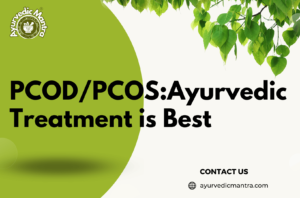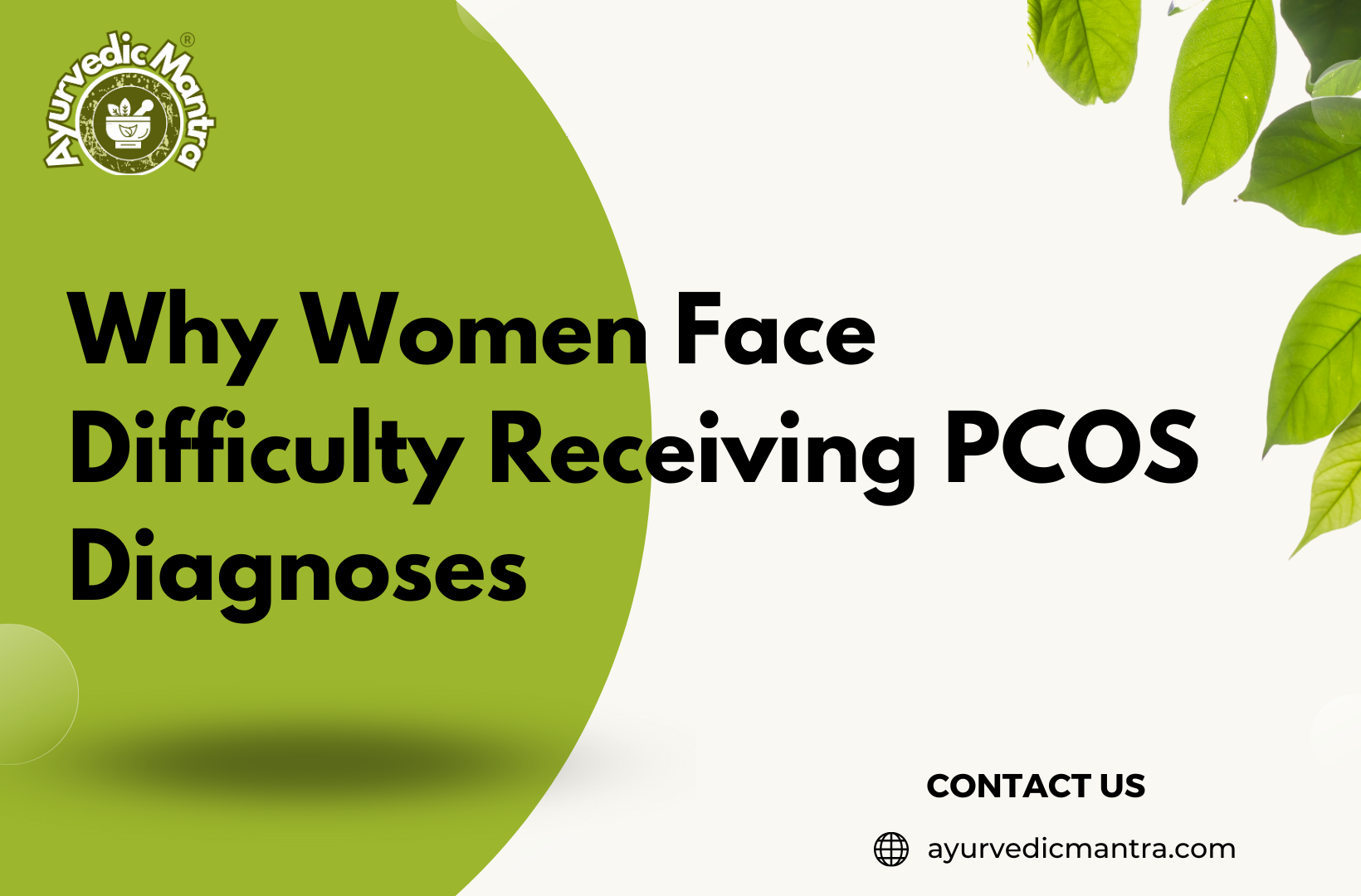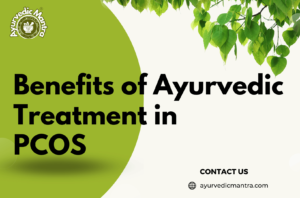
PCOD/PCOS: Ayurvedic Treatment is Best
Introduction Polycystic Ovary Disorder (PCOD) or Polycystic Ovary Syndrome (PCOS) is a common endocrine disorder affecting millions of women worldwide. It leads to hormonal imbalances,


Polycystic Ovary Syndrome (PCOS) is a complex hormonal disorder that affects countless women worldwide. Despite its prevalence, many women find themselves grappling with challenges regarding receiving timely and accurate PCOS diagnoses. This comprehensive article delves into the various factors contributing to this issue and sheds light on potential solutions.
PCOS presents a constellation of symptoms, including irregular periods, excessive hair growth, weight gain, and acne. Unfortunately, these symptoms can often be vague and overlap with other conditions, leading to misunderstandings and misdiagnoses. Women might dismiss these symptoms as normal variations, preventing them from seeking medical attention.
One significant hurdle is the overall lack of awareness surrounding PCOS. Many women and even some healthcare providers remain unfamiliar with the syndrome’s full spectrum, leading to oversight and underdiagnoses. Raising awareness through educational campaigns can empower women to recognize potential symptoms and advocate for proper evaluations.
The diagnostic criteria for PCOS have evolved, contributing to inconsistencies in diagnoses. The Rotterdam criteria are commonly used, considering various factors, including irregular periods, hyperandrogenism, and ovarian cysts. However, not all medical professionals adhere to these criteria uniformly, resulting in varying opinions and delayed diagnoses.
Conversations surrounding reproductive health can be uncomfortable for both patients and doctors. Women may hesitate to discuss intimate issues, and some healthcare providers might not initiate these discussions proactively. Creating a more open and supportive environment can encourage women to share their concerns, facilitating accurate diagnoses.
While PCOS is a leading cause of infertility, focusing solely on fertility aspects can be problematic. Some women with PCOS do not have immediate fertility concerns but experience other distressing symptoms. Shifting the narrative to encompass the broader impact of PCOS on overall well-being can lead to more comprehensive evaluations.
Cultural norms and socioeconomic status can influence access to healthcare and willingness to seek medical advice. In some cultures, discussions about reproductive health are taboo, while financial constraints can limit healthcare options. Tailoring awareness campaigns to address specific cultural beliefs and providing affordable healthcare can bridge these gaps.
Not all healthcare providers receive adequate training in recognizing and managing PCOS. The complexity of the syndrome requires a nuanced understanding, which might be lacking in some medical curricula. Continued medical education and specialized training can equip healthcare professionals to make timely and accurate diagnoses.
PCOS research has come a long way, but much remains to uncover. Limited data on how PCOS manifests in different populations and the underlying mechanisms can hinder precise diagnoses. Further research funding and studies focusing on diverse demographic groups can contribute to a more comprehensive understanding of PCOS.
PCOS symptoms can vary widely among individuals, making it challenging to establish a one-size-fits-all diagnostic approach. Some women might experience primarily hormonal symptoms, while others might struggle with metabolic issues. Tailoring diagnostic criteria to encompass these variations can improve accuracy.
The emotional toll of living with undiagnosed PCOS can be profound. Mood swings, depression, and anxiety are common among women with PCOS, yet these psychological aspects might not receive the attention they deserve during diagnostic evaluations. Incorporating mental health assessments into PCOS diagnosis protocols is crucial.
Receiving a timely and accurate PCOS diagnosis is crucial to managing the condition and preventing potential complications. Women’s challenges in obtaining these diagnoses are multifaceted, encompassing symptom variability, lack of awareness, and healthcare system gaps. By addressing these issues head-on, we can work toward a future where every woman with PCOS receives the care and support she deserves. Remember, if you suspect you have PCOS, advocating for your health and seeking knowledgeable healthcare professionals are vital steps in your journey toward wellness.
PCOS, or Polycystic Ovary Syndrome, is a hormonal disorder common among women of reproductive age. Irregular periods, excess androgen levels, and ovarian cysts characterize it. Diagnosing PCOS can be challenging due to its varied symptoms that often overlap with other conditions, leading to misdiagnoses. Additionally, a lack of awareness among patients and healthcare providers contributes to difficulty in obtaining accurate diagnoses.
PCOS symptoms can vary widely but commonly include irregular periods, excessive hair growth, acne, weight gain, and fertility issues. However, not all women with PCOS will experience the same symptoms, which adds to the complexity of diagnosis.
Distinguishing PCOS symptoms from normal variations can be challenging. If you notice persistent irregularities in your menstrual cycle, sudden and excessive hair growth, persistent acne, or unexplained weight changes, you must consult a healthcare professional for a thorough evaluation.
Raising awareness about PCOS is essential because many women and even some medical practitioners lack comprehensive knowledge about the syndrome. Increased awareness empowers women to recognize potential symptoms, seek medical advice, and advocate for proper diagnostic assessments.
Yes, there are diagnostic criteria commonly used to identify PCOS, known as the Rotterdam criteria. These criteria consider various factors, including irregular periods, elevated androgen levels, and ovarian cysts. However, adherence to these criteria can vary among healthcare providers, leading to differential diagnoses.
While PCOS is a leading cause of infertility, it can also impact a woman’s health. It’s important to note that PCOS can lead to metabolic issues, increased risk of diabetes, and psychological challenges such as mood swings and depression.
Initiating a conversation with your healthcare provider about PCOS concerns is essential. Start by describing your symptoms and any irregularities you’ve noticed in your menstrual cycle. If you suspect PCOS, don’t hesitate to ask for further evaluations or referrals to specialists.
Mental health is a significant aspect of PCOS that is often overlooked during diagnoses. Many women with PCOS experience mood swings, depression, or anxiety. Incorporating mental health assessments into diagnostic protocols can provide a more holistic understanding of the condition.
Cultural norms and beliefs can influence how PCOS is perceived and discussed. In some cultures, reproductive health discussions are taboo, hindering open conversations and timely diagnoses. Tailoring awareness campaigns to address cultural sensitivities is crucial.
Healthcare providers can enhance PCOS diagnoses by updating the latest diagnostic criteria and research. Specialized training in recognizing PCOS symptoms and understanding its diverse presentations can lead to more accurate and timely diagnoses.
PCOS research is continuously evolving to deepen our understanding of the syndrome. Ongoing studies help uncover the underlying mechanisms, variations in symptom presentation, and effective management strategies. Research advancements contribute to refining diagnostic approaches and improving patient care.
If you suspect you have PCOS, take proactive steps to advocate for your health. Talk with a healthcare provider, share your concerns and symptoms, and request comprehensive evaluations. Seeking out specialists experienced in PCOS care can also ensure you receive accurate diagnoses and appropriate management strategies.
Adopting a healthy lifestyle can positively impact PCOS diagnoses and overall well-being. Maintaining a balanced diet, exercising regularly, managing stress, and getting adequate sleep can help manage PCOS symptoms and improve diagnostic accuracy.
When seeking a healthcare provider for PCOS concerns, consider searching for reproductive endocrinology or gynecology specialists. Research local medical professionals, read reviews, and ask for recommendations from trusted sources to find a provider with experience diagnosing and managing PCOS.
Numerous online resources, patient advocacy groups, and medical organizations provide information about PCOS. Websites, forums, and social media platforms dedicated to women’s health can offer valuable insights and support for those seeking information about PCOS diagnoses and management.

Introduction Polycystic Ovary Disorder (PCOD) or Polycystic Ovary Syndrome (PCOS) is a common endocrine disorder affecting millions of women worldwide. It leads to hormonal imbalances,

Introduction Losing weight is a journey that requires dedication, consistency, and self-care. While there are numerous weight loss techniques out there, not all of them

Polycystic Ovary Syndrome (PCOS) is a hormonal disorder that affects millions of women worldwide. It can lead to various health complications, such as irregular periods,

In recent years, Ayurveda, an ancient system of natural healing originating from India, has gained significant popularity as an alternative approach to treating various health

आजकल वजन बढ़ने और चर्बी की वृद्धि होने की समस्या एक आम समस्या बन गई है। बढ़ते वजन और अतिरिक्त चर्बी के कारण न केवल

प्रस्तावना: आजकल वजन बढ़ने और ओबेसिटी की समस्या एक आम समस्या बन गई है। बढ़ते वजन के कारण न केवल शारीरिक समस्याएं होती हैं, बल्कि
